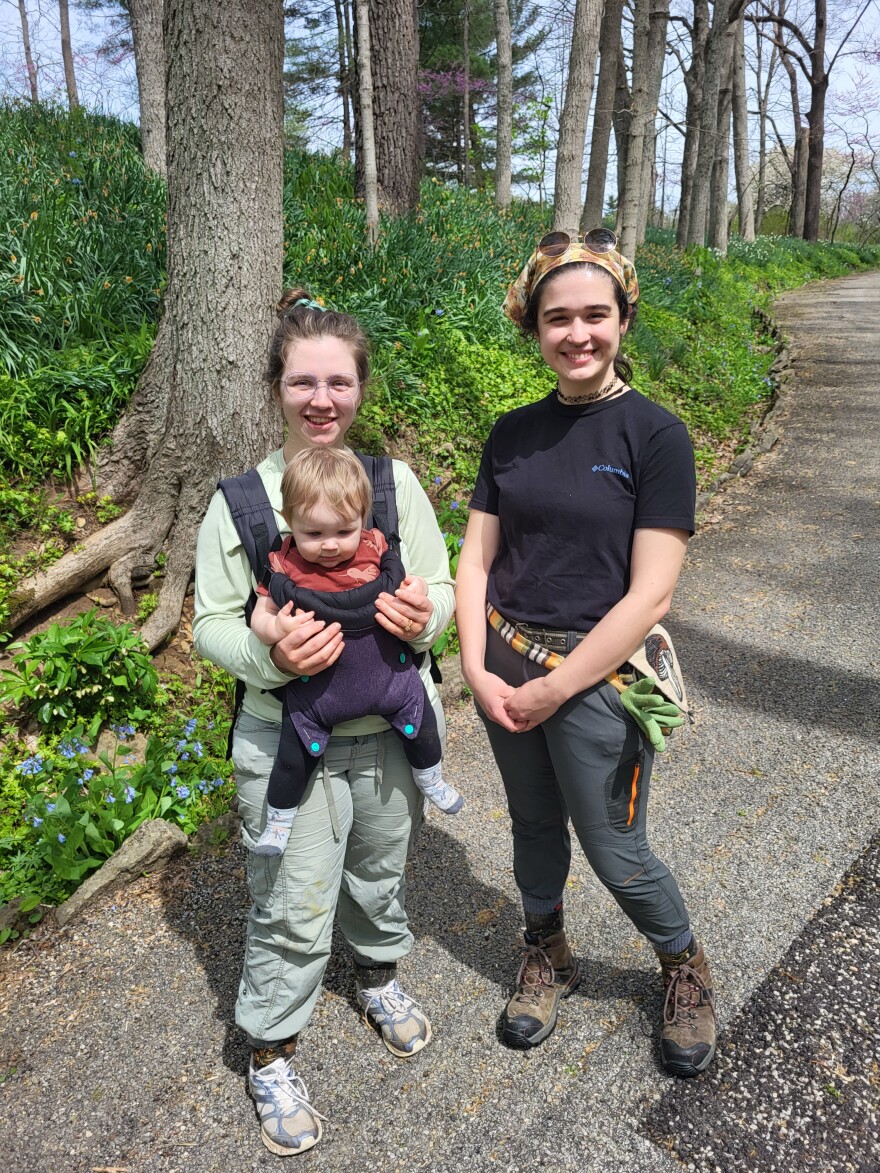April is Ohio Native Plant Month, and what better way to celebrate than going into the woods and removing invasive plants from the landscape that are choking out native plants. A group of 35 volunteers did just that at Aullwood Garden’s recent 11th Annual Big Pull. Renee Wilde brings us this story.
Renee Wilde: Volunteers are gathered at Marie Aull’s former house on a warm spring morning.
(SOUNDS OF TOOLS BEING DISPERSED)
They chat with each other about recent sightings of native spring plants as they grab gloves, buckets, shovels and soil knives from the back of a park ATV, before heading out into the woods to spend a couple hours pulling up invasive plants like garlic mustard, multiflora rose, and bush honeysuckle.
15-year-old Nora Tempus is here today with her 12 year old sister Caroline and their mother Nikki.
Nora Tempus: We got recruited by Hope Taft at a Dayton Areas Wild Ones meeting, and have been volunteering with Metro Parks forever, and just love Aullwood Audubon and Aullwood MetroPark and are just happy to give back.
Taking out invasive plants is one of my favorite things to do outside.
Caroline Tempus: We like weeding.
Wilde: Why is that?
Nora Tempus: It’s just very satisfying and you can really see the impact in a positive way.

Wilde: This is the 11th year that the Garden Club of Dayton, Five Rivers Metro Parks and Aullwood Audubon have joined forces to restore the woodlands around Marie Aull’s home by removing non-native, invasive plants.
Elizbeth Langford: Yes, I’m Elizabeth Langford. I’m the site leader for Five Rivers Metro Park at Aullwood Garden. Today was about having volunteers to be able to go out and dig and retrieve all the invasive species we have on the property so we can make room for our native plants.
The more people that can come and help assist us with this, the bigger impact we can have which will assist in everybody's experience of seeing more native plants coming and filling those spaces where they have been replaced by invasives.
Wilde: What are some of the native plants people will see here?
Langford: We have mayapple, trilliums, solomons seal, (and) spring beauties. We have Virginia Bluebells that was started by Marie and John Aull. They started with a hundred plants and she planted them in the woods.
John Aull had asked her, ‘Why are you doing that in the woods?'
She said, ‘I want to have an ocean of blue’.
And so that’s come about.

Wilde: And it really is a spectacular ocean of blue as you look around the woodland gardens. Marie Aull was a member of the Garden Club of Dayton who founded the first nature center in the midwest in the 1950’s, Aullwood Audubon Center and Farm, and donated it to the community. In 1977, Aull donated her home and 30-acre garden to the park district. She continued living in her home, which overlooks the Stillwater River, while keeping her garden open to the public.
Monica Snow: Oh, it’s a hidden gem.
Wilde: Monica Snow came out for the big pull.
Snow: This was my first big pull and it was so much fun. I was fortunate enough to know Marie. Her niece, Mary Prue, lived on my street in the Oregon district, and so Mary would bring us out here.
Wilde: Marie would be happy to know that her garden is still being enjoyed by the community and inspiring younger generations of conservationists and gardeners, like sisters-in-laws Susan and Rachel Havern were volunteering today.

They worked together pulling up invasive plants with Rachel’s 10 month old daughter Silvie strapped to their chests.
Rachel Havern: Silvie’s really into being outside and everything. She can’t do long stretches yet, and definitely can’t tell what she’s pulling. I wouldn’t say she’s awfully successful but she did hold a honeysuckle plant. This is great. It’s so nice to be out in the woods and all the flowers are in bloom.
Susan Havern: It’s cool to be a part of something small that is just so big at the same time. It’s just cool to be able to say, hey, I was here and I did this.
So it’s just the little things that help out with the community that I think are really important.
Rachel Havern: It makes you feel a lot more invested, too, in what’s going on.
Wilde: This year’s Big Pull removed 34 contractor-sized bags of invasive plants. Marie Aull’s gardens are open to the public year round. Aullwood Gardens is celebrating Marie and John Aull’s 100th Wedding Anniversary this summer.


